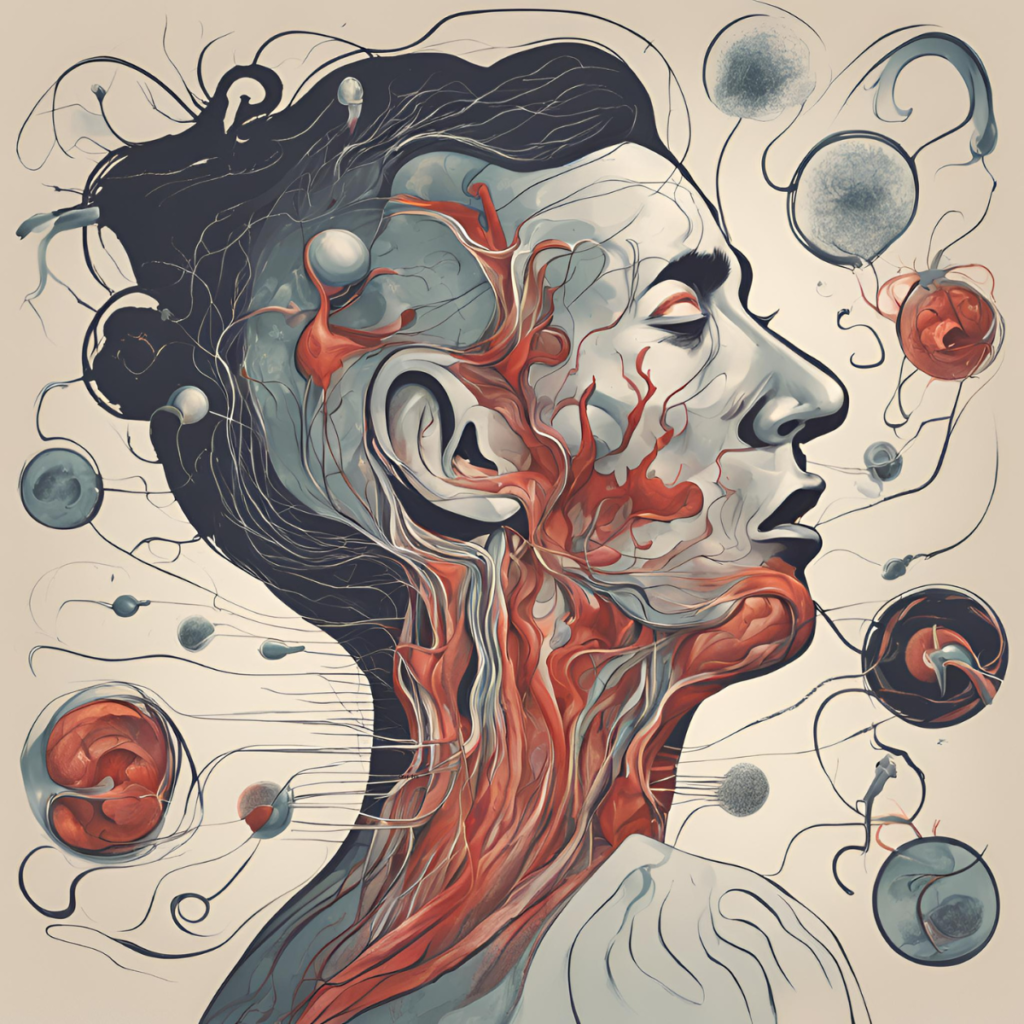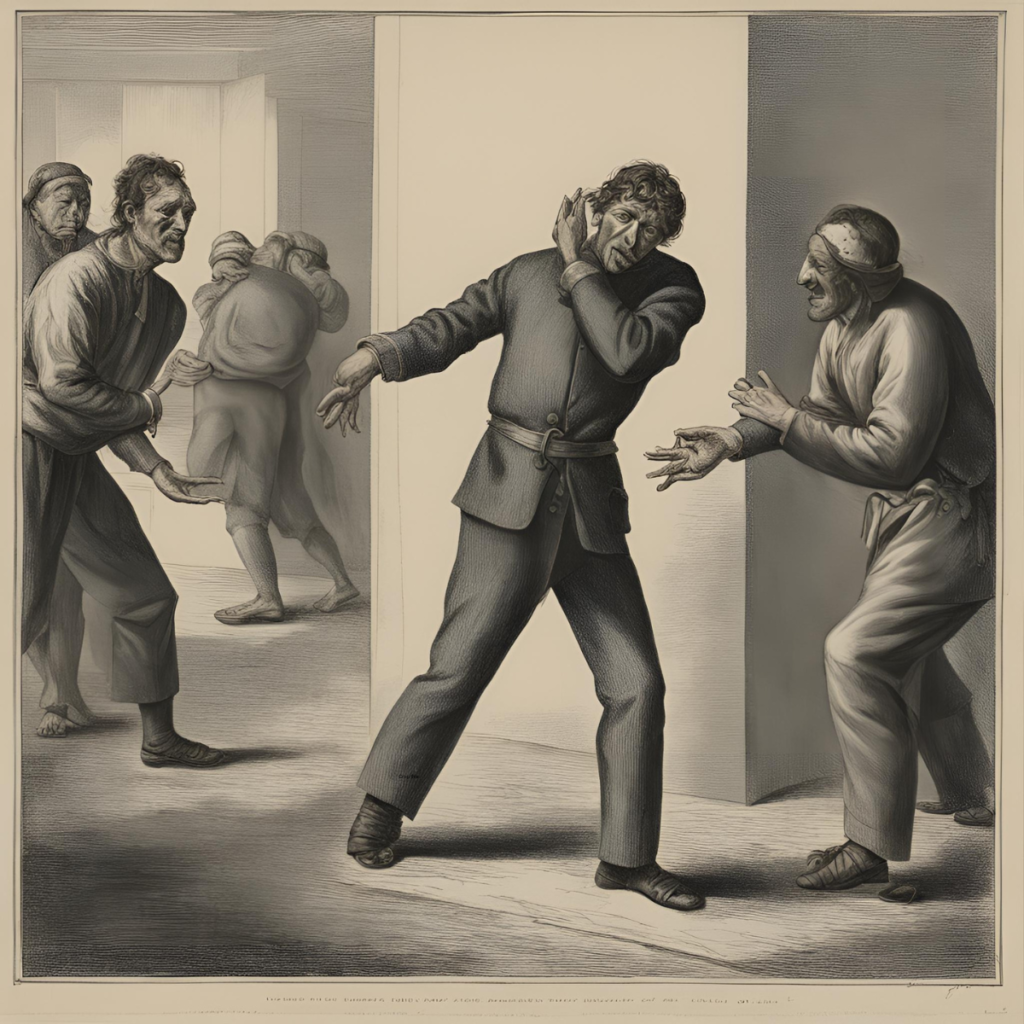I bet you’ve been caught in that classic dilemma—your gut screaming “go for it!” while your conscience whispers, “maybe think this through?” These moments of inner tug-of-war, guided by Freud’s timeless trio—the Id, Superego, and Ego—offer profound insights into our daily antics and aspirations.
Join me on a journey through Freud’s psychological playground, where these three characters—the Id with its wild urges, the Superego with its moral rulebook, and the Ego trying to play referee—constantly duke it out inside our heads causing all kinds of anxiety and stress. It’s not just theory; it’s a map to navigating the rollercoaster of human behavior and emotions.
Freud’s Model: Id, Superego, and Ego
At the heart of Sigmund Freud’s psychoanalytic theory lies the idea that our psyche is a battleground divided into three factions: the Id, the Superego, and the Ego. Each one plays a crucial role in shaping our thoughts, actions, and overall psychological circus.

The Id
Meet the Id, our pleasure-seeking party animal. It’s all about instant gratification—hungry? Eat! Thirsty? Drink! It’s like having a toddler at a candy store, demanding satisfaction now, consequences be darned. The Id is where our raw emotions and desires spring from, steering our decisions like a GPS set to “fun now, deal with it later.”
The Superego
In the other corner, we have the Superego, the internalized voice of reason and morality. Shaped by societal norms and parental teachings, it’s the part of us that says, “No, you can’t have that third slice of cake—it’s not fair to your waistline or your dentist.” The Superego acts as our moral compass, striving for perfection and enforcing rules that keep us from turning into complete chaos machines.
The Ego
Now, smack dab in the middle, balancing these two eternal rivals, is the Ego. Think of it as the overworked mediator at a family dinner, trying to keep Uncle Id from starting a food fight with Aunt Superego. The Ego operates on the reality principle, juggling the Id’s demands for instant gratification with the Superego’s stern reminders of what’s socially acceptable. It’s all about finding that sweet spot where you get what you want without causing a cosmic mess.
Previous post on Ego Defense Mechanisms: Ego Defense Mechanisms: Navigating Inner Conflict.
Freud’s tripartite model of the psyche—Id, Superego, and Ego—gives us a profound framework to understand the intricate dance of instinctual drives, moral codes, and sanity checks in human psychology. By diving into these concepts, we unlock not just the secrets of anxiety and guilt, but also pathways to personal growth and understanding.
Types of Anxiety Caused by Id-Superego Conflict
The clash between Freud’s Id and Superego isn’t just a philosophical sparring match—it can lead to some serious anxiety issues. Understanding them is half the battle, and the other half is trying not to freak out about it.

Moral Anxiety
That twinge of guilt when you know you’re about to do something your mom would disapprove of. That’s moral anxiety kicking in. It’s that uncomfortable feeling when your actions clash with your moral compass—like contemplating cheating on a test while your Superego gives you side-eye. It’s like having a tiny judge in your head, ready to throw the book at you for even thinking about bending the rules.
Neurotic Anxiety
On the flip side, there’s neurotic anxiety, which is basically your Ego going into meltdown mode. It’s that irrational fear that if you give in to your Id’s wild side, everything will go up in flames—socially, academically, or just about any other -ly you can think of. It’s the stress of trying to keep your impulses in check, lest they lead you down a path of chaos and regret.
Reality Anxiety
Then there’s reality anxiety, the more straightforward cousin of the bunch. This one’s less about inner turmoil and more about external threats—like worrying about losing your job, getting chased by a bear, or having your favorite show canceled. It’s your Ego’s way of reminding you that while inner conflicts are a trip, sometimes the world outside can throw you a curveball that’s way scarier than your Id’s latest whims.
Understanding these anxieties isn’t just about psychoanalytic buzzwords—it’s about recognizing how our inner battles shape our emotional landscapes and, ultimately, our personal growth.
Let’s dive deeper into how these anxieties can trigger emotional rollercoasters like shame, guilt, embarrassment, and regret. Because if we’re going to dissect the human psyche, we might as well have some fun with it!
Acute Stress and Emotional Reactions
When Freud’s dynamic trio throws down, it’s not just a philosophical debate—it’s a full-blown emotional rollercoaster.

Here’s how these conflicts can lead to some serious emotional fireworks:
Acute Stress from Id-Superego Conflict
Picture this: you’re torn between giving in to your Id’s demands and listening to your Superego’s warnings. Your heart races, palms sweat, and suddenly you’re in full-fledged fight-or-flight mode, all thanks to your inner wrestling match. It’s like your body’s own version of reality TV, with your Ego desperately trying to keep the show from getting canceled.
Research by psychologist Dr. Anna Freud suggests that this stress response isn’t just in your head—it’s your body’s way of saying, “Hey, we’ve got a situation here, and we need to figure it out before things get messy.”
Shame
Ah, shame—the gift that keeps on giving. It’s that sinking feeling when you realize you’ve messed up big time and everyone knows it. Psychologist Jean-Paul Sartre likened it to realizing you’ve forgotten your lines in the middle of a play—it’s awkward, it’s uncomfortable, and you wish you could crawl into a hole and never come out. Shame is like your Superego’s way of giving you a stern look and saying, “We need to talk.”
Guilt
Unlike shame, guilt packs a different punch. It’s that weight on your shoulders when you know you’ve done something wrong and you can’t shake the feeling. Psychologist Erik Erikson saw guilt as a crucial part of growing up—it’s your Ego’s way of saying, “Hey, we messed up, but let’s learn from this and do better next time.” Guilt is like your conscience’s reminder that being human means making mistakes—and hopefully, learning from them.
Embarrassment
Ever tripped over your own feet in front of a crowd? That’s embarrassment for you. It’s that blush-inducing moment when you wish the floor would swallow you whole. Psychologist Helen Lewis saw it as a social survival tool—it keeps us in check and reminds us of social norms. Embarrassment is like your Ego’s way of saying, “Oops, let’s pretend that didn’t happen.”
Regret
Lastly, there’s regret—the bittersweet reminder that hindsight is 20/20. It’s that pang of wishing you’d done things differently, whether it’s choosing a different career path or simply not eating that extra slice of pizza. Philosopher Ralph Waldo Emerson viewed regret as a chance for growth—it’s your Ego’s way of saying, “Okay, we messed up, but let’s turn this into a life lesson.”
Managing Emotional Responses
Self-Compassion and Acceptance
Instead of beating yourself up, try giving yourself a break. Self-compassion is like your Ego handing out hugs, reminding you that everyone messes up sometimes. Acceptance means recognizing that you’re human—and that’s okay.
Reflective Writing and Journaling
Ever tried putting pen to paper? Reflective writing lets you sort through your thoughts, spot patterns, and gain insights. Journaling is like your Ego’s diary—it’s a safe space to unpack those emotional suitcases.
Cognitive Behavioral Techniques
Sometimes, a little mental spring cleaning is in order. Cognitive-behavioral therapy helps you reframe negative thoughts and see things from a new perspective. It’s like your Ego putting on its detective hat and solving the case of the gloomy mood.
Seeking Support and Encouragement
No one’s an island. Talking to friends, family, or a therapist can give you a fresh perspective and a shoulder to lean on. It’s like your Ego saying, “Hey, let’s get a second opinion on this.”
Exploring the emotional rollercoasters—shame, guilt, embarrassment, and regret—sparked by Freud’s Id and Superego shows us that being human is a wild ride. By understanding these emotions and using coping strategies, we can navigate our inner battles with more resilience and self-awareness.
Let’s delve into defensive guilt and self-flagellation, because sometimes our inner critics need a reality check too.
Defensive Guilt and Self-Flagellation
Ever found yourself in the guilt-trip express lane? Freud’s Id and Superego often team up to send us on a guilt trip, but understanding these responses sheds light on how we handle ethical dilemmas and self-judgment.

Let’s peel back the layers of defensive guilt and self-flagellation.
Characteristics of Defensive Guilt
Defensive guilt is like wearing an invisible hair shirt—it’s that nagging feeling that you’ve somehow let down the moral team. Psychologically, it’s your Superego on overdrive, making you feel bad for every little slip-up.
It’s like your Ego’s GPS rerouting you to Guilt City whenever you stray from the moral high ground.
Symptoms and Emotional Impact
Picture this: you accidentally bump into someone on the sidewalk. Your Superego immediately hits the guilt button, and suddenly you’re replaying the scene in your head like a guilt-ridden director. Symptoms include over-apologizing, ruminating over past mistakes, and feeling like you’re constantly under moral scrutiny. It’s like your Ego’s stuck in a guilt-induced time loop, trying to find the exit.
Causes and Triggers
What triggers this guilt fest? It could be societal expectations, cultural norms, or even your own high standards. Psychologist Albert Ellis saw it as the result of irrational beliefs—like believing you should be perfect and never make mistakes. It’s like your Superego handing you a list of “shoulds” and “musts,” with a side of guilt.
Strategies for Managing Defensive Guilt
So, how do you hit pause on the guilt trip? Here are a few strategies to help you navigate the maze of defensive guilt and find your way back to self-compassion:
Challenge Irrational Beliefs
Take a page from cognitive-behavioral therapy and question those guilt-inducing beliefs. Is it really the end of the world if you accidentally step on someone’s toe? Probably not. It’s like your Ego’s reality check, reminding you that nobody’s perfect.
Practice Self-Compassion
Give yourself permission to be human. Self-compassion is like your Ego’s hug—it’s a gentle reminder that everyone makes mistakes, and that’s okay. It’s like your Superego’s sigh of relief, knowing you’re not aiming for perfection.
Learn from Mistakes
Instead of beating yourself up, try learning from your slip-ups. Psychologist Carl Rogers saw it as a chance for growth—it’s like your Ego’s evolution, turning mistakes into life lessons. It’s like your Superego’s nod of approval, knowing you’re aiming for progress.
Seek Support and Perspective
Talking to friends, family, or a therapist can offer fresh insights and support. It’s like your Ego’s compass, pointing you in the right direction when guilt clouds your judgment.
By understanding defensive guilt and its emotional impact, we can peel back the layers of self-flagellation and find a healthier path to self-acceptance. Remember, laughter can be the best medicine when your Superego starts playing the blame game.
Self-Flagellation: Understanding and Managing the Inner Critic
Ever feel like you’re your own worst critic? Welcome to the world of self-flagellation, where Freud’s Id and Superego team up to send you on a guilt trip through the Valley of Self-Doubt. But fear not—by understanding this inner critic, we can deflate its overinflated ego.
Characteristics of Self-Flagellation
Self-flagellation is like wearing emotional hair shirts—it’s that self-punishing voice that tells you everything’s your fault. Psychologically, it’s your Superego wielding the guilt whip, making you feel unworthy or undeserving. It’s like your Ego’s tug-of-war with self-doubt, trying to prove you’re not as bad as your inner critic says.
Symptoms and Emotional Impact
Imagine this: you make a small mistake at work, and suddenly your inner critic turns into a full-blown judge and jury. Symptoms include harsh self-criticism, feelings of inadequacy, and a constant need to prove yourself. It’s like your Ego’s stuck in a guilt-induced Groundhog Day, reliving past mistakes on repeat.
Causes and Triggers
What fuels this self-critical fire? It could be perfectionism, fear of failure, or even childhood experiences. Psychologist Karen Horney saw it as the result of unrealistic expectations—like believing you must never mess up or else. It’s like your Superego handing you a “guilt on demand” subscription, with no off button.
Strategies for Managing Self-Flagellation
So, how do you silence the inner critic? Here are a few strategies to help you navigate the maze of self-flagellation and find your way back to self-acceptance:
Practice Self-Compassion
Give yourself the same kindness and understanding you’d offer a friend. Self-compassion is like your Ego’s soft pillow—it cushions the blows of self-doubt and criticism. It’s like your Superego’s deep breath, knowing you’re worthy of forgiveness.
Challenge Unrealistic Standards
Take a step back and question those sky-high expectations. Are they realistic, or are you setting yourself up for failure? It’s like your Ego’s reality check, reminding you that perfection is an illusion.
Focus on Growth, Not Perfection
Embrace the idea of progress over perfection. Psychologist Abraham Maslow saw it as the journey toward self-actualization—it’s like your Ego’s evolution, striving to be the best version of yourself. It’s like your Superego’s nod of approval, knowing you’re aiming for growth.
Seek External Validation
Sometimes, a fresh perspective can shift your inner dialogue. Talking to supportive friends, family, or a therapist offers new insights and encouragement. It’s like your Ego’s lifeline, pulling you out of the guilt spiral.
By understanding self-flagellation and its emotional impact, we can rewrite the script of our inner critic and embrace self-compassion. Remember, humor can be a powerful antidote to guilt trips—especially when your Superego starts booking first-class tickets.
Forgiveness: Embracing Compassion and Letting Go
Ever struggled with forgiveness? Freud’s Id and Superego often clash over this moral dilemma, but understanding forgiveness and its emotional weight offers a path to healing and self-compassion.

Characteristics of Forgiveness
Forgiveness is like emotional yoga—it’s that liberating act of letting go and moving forward. Psychologically, it’s your Ego embracing compassion and releasing resentment or anger. It’s like your Superego’s deep breath, acknowledging that holding onto grudges only weighs you down.
When you forgive someone else, you’re not excusing their actions—you’re freeing yourself from the burden of anger or resentment. It’s like your Ego’s exhale, releasing negative emotions and reclaiming your emotional space. It’s like your Superego’s nod of approval, recognizing that compassion heals wounds.
Self-forgiveness is like hitting the reset button—it’s acknowledging your mistakes and choosing to move forward with self-compassion. It’s like your Ego’s evolution, learning from past experiences and embracing personal growth. It’s like your Superego’s sigh of relief, knowing that everyone makes mistakes—and that’s okay.
Strategies for Cultivating Forgiveness
So, how do you cultivate forgiveness? Here are a few strategies to help you navigate the maze of resentment and embrace compassion:
Practice Empathy
Put yourself in the other person’s shoes and try to understand their perspective. Empathy is like your Ego’s bridge—it connects hearts and fosters understanding. It’s like your Superego’s nod of approval, acknowledging that we’re all human.
Let Go of Resentment
Holding onto anger or resentment only poisons your own well-being. Letting go is like your Ego’s detox—it cleanses your heart and soul of negativity. It’s like your Superego’s exhale, releasing the grip of grudges.
Embrace Self-Reflection
Reflect on your own actions and choices with honesty and compassion. Self-reflection is like your Ego’s mirror—it reveals insights and opportunities for growth. It’s like your Superego’s nod of approval, recognizing your efforts to do better.
Seek Closure and Healing
Sometimes, closure comes from within. Whether through journaling, therapy, or heartfelt conversations, seek ways to heal emotional wounds and find peace. It’s like your Ego’s journey, navigating the path to forgiveness and self-compassion. It’s like your Superego’s sigh of relief, knowing that healing begins with a forgiving heart.
By embracing forgiveness and letting go of emotional baggage, we pave the way for personal growth and emotional freedom. Remember, laughter can be the best medicine when forgiveness feels like a heavy burden—especially when your Superego needs a gentle reminder to lighten up.
Understanding Freud’s model of the psyche—the Id, Superego, and Ego—takes us on a journey through the complexities of human behavior and emotions. It’s not just about theoretical concepts; it’s about unraveling the inner workings of our minds, navigating conflicts between instinctual desires, moral imperatives, and reality checks.
By exploring the dynamics of Id-Superego conflict and its impact on anxiety, guilt, and emotional responses, we gain insights into our personal growth and self-awareness. These insights aren’t just academic—they’re practical tools for managing inner turmoil, embracing forgiveness, and cultivating compassion for ourselves and others.
So, the next time you find yourself at odds with your impulses or wrestling with guilt, remember Freud’s trio. Acknowledge the Id’s desires, listen to the Superego’s wisdom, and let the Ego be your guide through life’s emotional rollercoasters. Embrace humor along the way—it’s the secret ingredient that lightens the load and reminds us that even our inner struggles deserve a smile.
In the end, Freud’s model invites us to embrace our humanity—flaws, conflicts, and all—and to embark on a journey of self-discovery and growth. Let’s navigate these psychological waters with curiosity, compassion, and a healthy dose of humor. After all, understanding ourselves is the first step toward living our path to bliss.
Get the next post in your email.


